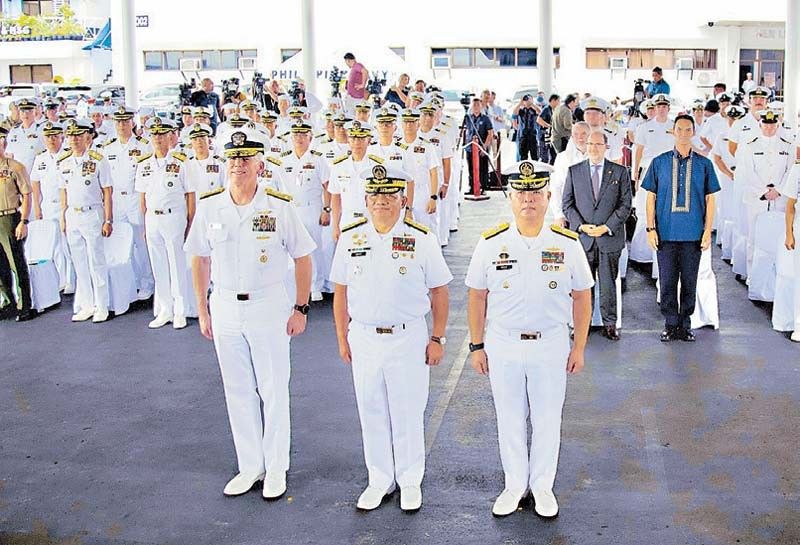Philippines, allies begin SAMASAMA naval exercise in West Philippine Sea

MANILA, Philippines — As Filipino fishermen deal with another round of Chinese bullying in Philippine waters particularly around Panatag (Scarborough) Shoal, a multilateral naval exercise in the West Philippine Sea jointly led by the Philippine Navy (PN) and US Navy kicked off yesterday.
This year’s SAMASAMA Exercise, which runs until Oct. 13, is aimed at promoting a rules-based international order as well as a free and open Indo-Pacific Region. Organizers stressed the naval exercise is not directed at the Chinese.
The exercise will include discussions and interoperability maneuvers with the Japan Maritime Self Defense Force, Royal Australian Navy, Royal Canadian Navy and the United Kingdom’s Royal Navy. Details like the number of men and ships involved have not been revealed.
The Armed Forces of the Philippines earlier said the Royal New Zealand Navy and Indonesian Navy were involved in the exercise as observers.
The SAMASAMA Exercise “used to be a bilateral exercise but we thought of expanding it to become a multilateral exercise,” PN chief Vice Admiral Toribio Adaci said.
“This is strengthening our competencies, the technical competencies of our sailors and of course the Marines, this is promoting interoperability, this is promoting alliances and partnerships and it does not necessarily have to be conducted in a particular place,” he said, referring to the ongoing exercise.
Adaci added that the 2016 Arbitral Award on the West Philippine Sea “speaks for itself and the ruling upheld the sovereign rights of the Filipinos in the West Philippine Sea and that is basically following international law and this is what we would promote, a rules-based international order.”
US 7th Fleet Commander Vice Admiral Karl Thomas said this year’s SAMASAMA Exercise aims to prove “that the global maritime commons are used by everybody and everybody wants the global maritime commons to be free and open so our navies inherently sail and operate together.”
He noted that eight navies participating in the exercise strictly adhere to the United Nations Convention on the Law of the Sea (UNCLOS).
“We all want peace in this region and by demonstrating that we know to operate in accordance with the rule of the law, we de-create the chance for miscalculation,” Thomas explained.
Thomas also emphasized that every nation has the right to sail and operate peacefully in the West Philippine Sea without having to worry about being coerced or intimidated.
“You know, we want the commons to be common and open and free and so as long as our nations operate in accordance with the rule of law, in accordance with the rules and regulations, the UNCLOS, there will be no issues… and so showing a strong team that will operate together as a group of navies, that could do nothing but strengthen the deterrence, so we maintain the peace and that’s what we all want… in this part of the world,” he said.
The US naval official said the SAMASAMA Exercise provides a great opportunity for each participating navy to be better, as “we all learn from one another.”
“Let’s see where we can take this exercise but this is just one of the many exercises that we conduct in the region but it’s a very important one and I applaud the Philippine leadership in being willing to bring in other nations to what was a bilateral exercise and expand it so that we learn and train with one another, that’s how you get better,” he said.
No 24/7 patrols
Meanwhile, the Philippine Coast Guard (PCG) said it is set to increase its patrols in the Panatag Shoal but not on a round-the-clock basis, as it does not have enough vessels to complete the task, spokesman Commodore Jay Tarriela said yesterday.
“The Philippine Coast Guard, under the leadership of Coast Guard Admiral Artemio Abu, is committed to sustain our patrols in Bajo de Masinloc with the primary objective of protecting the safety of our Filipino fishermen,” Tarriela said, referring to Panatag by its original name.
“However, due to the limited number of floating assets, we cannot be able to maintain our constant presence there. What we can only commit is our plan to increase our patrol in Bajo de Masinloc but not 24/7,” he added.
He was reacting to requests from fishermen belonging to the Bigkis ng mga Mangingisda Federation in Masinloc for PCG protection against harassment by the Chinese coast guard and militia vessels in Panatag Shoal.
The fishermen complained that the CCG deployed rubber boats around the shoal to keep them from entering the lagoon.
Last Sept. 25, the PCG removed the 300-meter floating barrier installed by the CCG in the southeast part of the shoal. — Evelyn Macairan
- Latest
- Trending


























